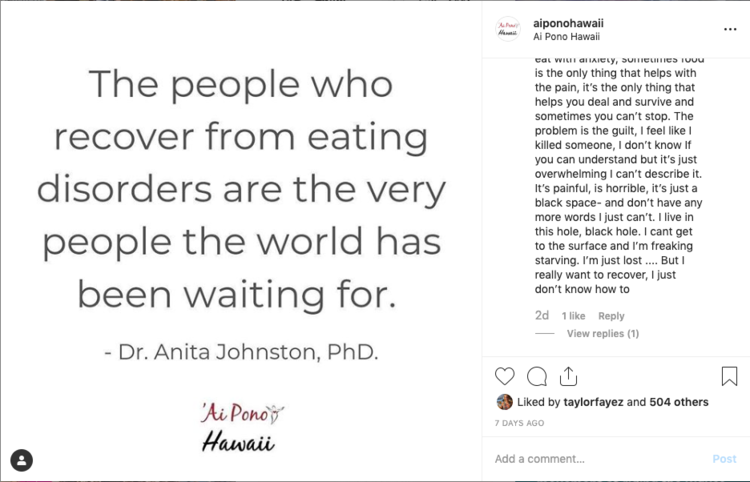Being a loved one of someone with an eating disorder is incredibly challenging.
It’s important to know that you are not alone, and furthermore, that even the best and most supportive parents, spouses, siblings, and friends are not expected to know what to do in every situation. The first step to helping a loved one who you believe has an eating disorder is to inform yourself a bit more about the disorder. Eating disorders are serious and potentially devastating illnesses related to eating behaviors that negatively impact health, emotions and the ability to function in daily life.
One of the major barriers for family members in talking to their children about eating disorders or being there for them during the recovery process is the concern that maybe this is my fault. It is vital to understand that although there might be precipitating events, there is no singular cause for the development of an eating disorder. For example, teens are at particularly high risk for developing eating disorders due to societal and peer group pressure and participation in competitive sports.
Once you have determined that there is an issue, helping your loved one identify, speak out about, and seek treatment for an eating disorder involves patience, education, and more often than not, the support of a team of professionals specifically qualified in the treatment of eating disorders. Read on below for some tips on how to begin navigating this process, and of course, always feel free to contact us for additional support.
Your involvement can make all the difference in both your loved one’s and your own life.
some helpful tips
Prior to admission
Identifying warning signs: Early warnings signs of eating disorders may be hard to identify, particularly because our society tends to normalize and reward ‘healthy’ eating and weight loss. For a list of eating disorders and their symptoms, be sure to check out What we Treat.
Get educated: After you have identified warning signs, get educated on eating disorders and learn how to talk to your loved one about their eating behaviors. Here is a great article with helpful tips on how to talk to a loved one who you suspect might have an eating disorder.
Seek help and support: Finding out that your loved one is struggling – with anything for that matter!- can be incredibly difficult, especially when as a family member we might also have to admit that we might not be able to handle it on our own. Our Admission’s team is here to support you in navigating the treatment process and we offer free phone consultations if you are unsure if your loved one is eligible for treatment with us.
During treatment
Practice empathy: Sometimes it is hard to relate to or understand someone who is struggling with an eating disorder. We want to say yell, ‘just eat!”‘ or ‘just stop eating!’ but it doesn’t work and it often makes the situation worse. Talk to your treatment team about new ways to foster empathy and communicate more effectively with your family member. This is particularly challenging with dealing with teens with eating disorder since teens brains are in a developmental phase that can make communication difficult, which can often result in further emotional dysregulation.
Take time to look at your own behaviors: Sometimes, the things we view as helpful or normal are in fact not helpful when it comes to trying to correct disordered behavior or support someone with an eating disorder. It takes courage to look at our own roles as parents and how we may or may not be supporting the disorder instead of the recovery.
Ask questions about the treatment and recovery process! You can’t ask too many questions and we absolutely expect you to acquire more along the way. This is your process too, eating disorders affect the entire family unit, not just the individual struggling with the particular disorder.
Try not to develop or cling to expectations: This is a tough one, but we have to accept that everyone’s recovery process is unique to them and we can promise you, no one’s recovery is linear- meaning there will be twists , and turns, and bumps in the road. This is all normal.
Stay connected with the treatment team: We will do our very best to provide you with regular updates on your family member’s progress, but we also love to hear from you when questions or challenges come up. As the parent of a minor, you can expect to be contacted by your child’s Primary Therapist within the first 2-3 days after arrival, and may be requested to attend distance or in-person family sessions to aid in their treatment process.
Post discharge
Consult with your family member’s treatment team about a discharge plan: Effective treatment extends past residential care and the development of a detailed aftercare plan will be crucial in improving your loved one’s chances at sustained and complete recovery. Particularly in the case of teens with eating disorders, when your teen returns to the school or social environment, the triggers will likely persist, therefore it is important that they are able to recognize and process these triggers and challenges with an eating disorder professional as they arise.
Make sure to consider secondary care: If possible, we will almost always recommend secondary care following residential treatment. This involves either Partial Hospitalization (PHP or day treatment) or Outpatient treatment when appropriate. This step-down approach enables patients to ease back in to daily life while remaining connected to their treatment team and having an environment in which they can work through new challenges as they arise.
Continue to seek your own support: The needs of loved one’s with an eating disorder are unique, and you need help too. Join online communities, identify support groups in your area, or seek out your own outpatient therapy. Check out our Resources page for more ideas.
For more information on how you can support your loved one in eating disorder recovery, check out our blog.
visitor policies
Interested in visiting your family member or loved one who is currently in residential treatment at our Maui location?
Visits with loved ones are permitted at staff discretion. Visits within the first 1-2 weeks are discouraged as this is a crucial adjustment period for our residents and outside triggers and influences may negatively affect the treatment process. Exceptions are possible, but would need to be discussed with our treatment professionals.
All visits should be scheduled and confirmed with the resident’s primary therapist at least seven days prior to the proposed visit. Patients are also responsible for submitting a visitation request form prior to any visits taking place. Visits should take place onsite and ideally during weekend hours if possible.
We maintain an environment of anonymity among our residents. For this reason, visitors may be asked to remain in certain areas for their visit out of respect for other clients and our healing space.
Visits may be monitored by staff members if this is deemed appropriate by our treatment team.
No outside food is permitted within our facility. Other gifts or packages may be searched by out staff in order to ensure a safe and supportive recovery environment for all of our residents.



